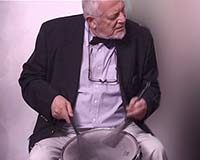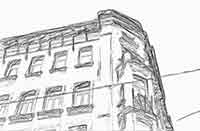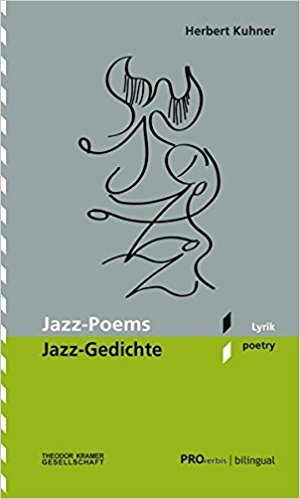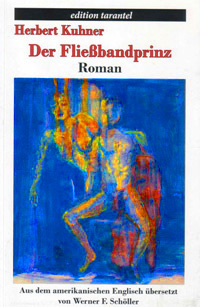Herbert Kuhner
from -Felled by Friendly Fire
A Memoir Consisting of
Autobiographical Short Pieces
aus -Sorglose Tage und Jahre in der Heimat
The German version of the Memoir
is forthcoming by Edition Tarantel, Vienna
Speaking German in a Dream
Herbert Kuhner, the writer, is in a sense a historian.
His life story runs parallel to history and illustrates that history
is too serious matter to be left exclusively to bona-fide historians.
“In 1935, the year of his birth, the Nuremberg Laws were imposed
in Germany. In 1938, when he was three years old, “The doorbell rang
and I ran to the door and opened it. My mother swept me away
as two men in street clothes entered. One of them, I remember clearly,
wore a brown suit and limped. The other was thin and balding
and wore a grey suit. They searched the apartment. The brown-suited man
shoved my grandmother, who was eighty-three away from the sideboard
in order to ransack it. And indeed it contained her shopping money.”
– Peter Malina, historian, Mit der Ziehharmonika, No.1, May, 1995
Erasing It
I cannot extract myself from the past.
I tried to erase it.
I did not want to have the identity
of being a victim,
but of course it could not be erased.
It is unbearable,
but it has to be borne
so that it can be told.
Telling it is a necessity.
For years, in order to keep going,
I had tried to bar thoughts of specific situations
of the past from my mind.
The other day, when I saw my Aunt Leni
and my Uncles Fritz and Heinrich
in a packed boxcar, I broke down and wept.
My cousin Karen Sanders (kisanders@sbcglobal.net) is researching the fate of family members.
The Golden Anniversary of the Annexation
At the unveiling of the monument commemorating the victims of the Holocaust, speeches of regret were read by political luminaries, Church dignitaries, public figures and high-ranking military men. Poets read epics about the slaughter of the victims and an oratorio was played and sung for the occasion. While those present vowed that what had happened must never happen again, a Jew was beaten by thugs in the midst of the ceremony. No one could hear the blows or his cries due to the chorus of raised voices. Nor could the beating be seen since the bystanders’ sight was blurry from the tears that were being shed.
Speaking German in a Dream
I dream in English.
I daydream in French.
My nightmares are in German.
Of all the mishaps and misadventures I have experienced in my literary career, the following takes the cake.
On June 28, 1983, there was a presentation of Hawks and Nightingales: Current Burgenland Croatian Poetry at the Croatian Academic Club. Dr. Albert F. Reiterer, then Editor-in-Chief of Braumüller Verlag composed a three-page invitation for the occasion on which the names of neither the editor nor translator were to be found. When queried about the omission, Dr. Reiterer stated that it was intentional and that it was not the publisher’s policy to give such credit.
On November 10, 1983, a presentation of Hawks and Nightingales was slated to take place at the America House, for which I had acted as an intermediary. Presentations of Carinthian Slovenian Poetry and Austrian Poetry Today (Schoken Bookswere to follow. And a reading tour featuring poetry from all anthologies was planned.
However, on November 9th, a day before the presentation, Cynthia Miller, the United States Cultural Attaché received a letter from Dr. Reiterer withdrawing from the presentation. Dr. Reiterer wrote: “I would like to convey to you, that due to recent events, our publishing house will not be able to send a representative to the reading that you have planned.”
(The “recent events” were allegedly the invasion of Grenada.)
The buffet was delivered and set aside. The guests were sent home and all other events were cancelled. That was the end of my relationship with the America House. I may not have been to blame for what had happened, but I had made the unfortunate connection with the publisher. Anti-Climax insert that if it hadn’t been for the participation of the United States in World War II, the Third Reich would still dominate Europe.
When I called Dr. Reiterer, he in informed me that he had achieved his intentions. That was the end of my relationship with the America House. I may have not been to blame for what had happened, but I had made the connection with the man who had caused the cancellation.
After our brief phone conversation, I received a bill for complimentary copies of Hawke and Nightingales dated November 23, 1983, which I had distributed for publicity and funding purposes. I quote, “Regretfully we cannot agree to having the book presented to people such as Peter Rath, who is the owner of a glass and chandelier company that has absolutely no connection with our publishing house.”
Peter Rath of Lobmeyr happened to be one of the sponsors of Austrian Poetry Today and received credit for his generosity in that publication.
It could not be said that my fellow editors twiddled their thumbs during this confrontation since they sat on their hands.
On December 20, 1983, I received a letter from Dr. Reiterer informing me that Herbert Gassner of the Croatian Academic Club had purchased 50 copies of Hawks and Nightingales on condition that Dr. Reiterer desist from harassing me with bills for complementary copies.
I quote Reiterer:“We regret that an uninvolved third party has entered this situation.” In other words harassing me with bills was more essential to him than selling copies of the book.
A Perpetrator Speaks
“Always remember, others may hate you,
but those who hate you don’t win
unless you hate them,
and then you destroy yourself.”
– Richard M. Nixon (Wise words from a man I do not admire.)
Semi-Climax
Not too long ago, I had a dream, which can be described as a nightmare. I was attending a symposium at a university. As I was walking on the campus, I saw the publisher in question. I approached him and threw a German expletive in his face. The word is Drecksau! (Apparently, there is no English word to match it.) After having said it, I immediately woke up. That’s the complete dream.
I cannot remember ever having spoken German in a dream since leaving “Ostmark” in 1939. At that time you didn’t have to have nightmares.
– Herbert Kuhner








 Users Today : 138
Users Today : 138 Users Yesterday : 66
Users Yesterday : 66 This Month : 2391
This Month : 2391 This Year : 22675
This Year : 22675 Total Users : 180770
Total Users : 180770 Views Today : 174
Views Today : 174 Total views : 1874880
Total views : 1874880 Who's Online : 1
Who's Online : 1










